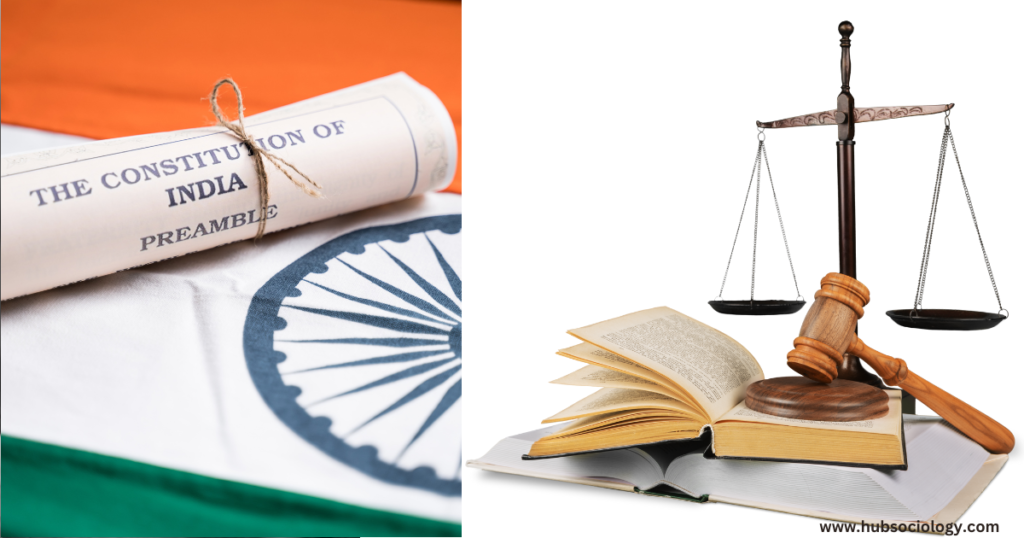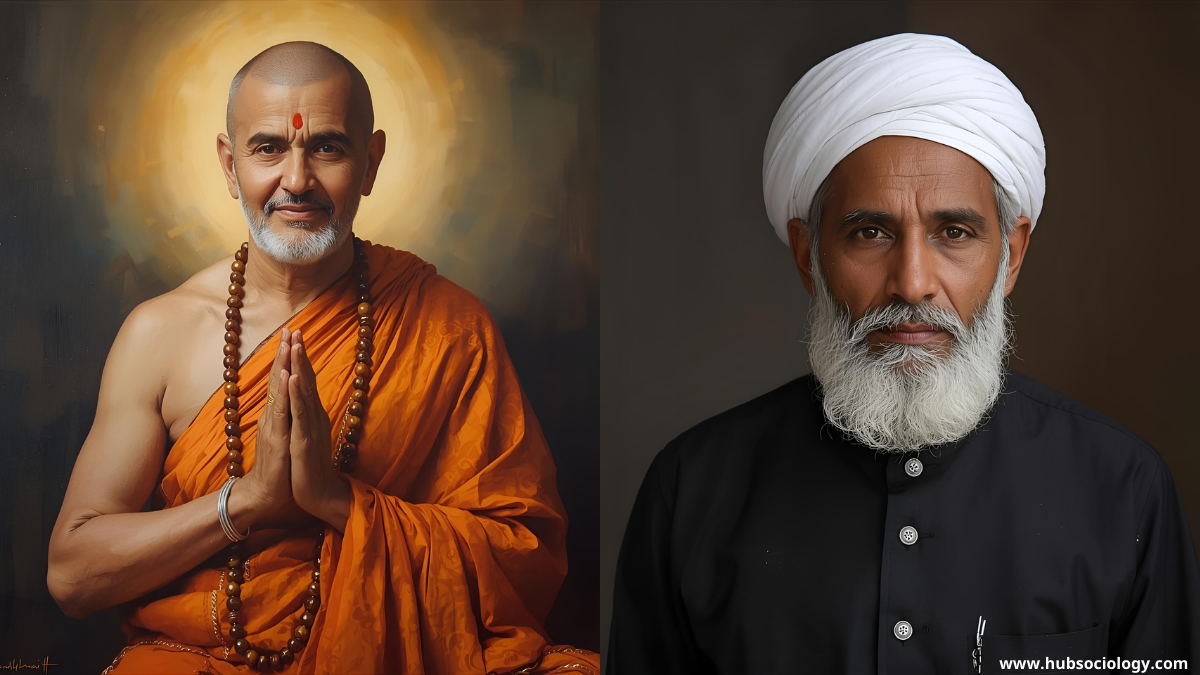Introduction on Religion and Politics
India is one of the most religiously diverse societies in the world, often described as the cradle of pluralism. Hinduism, Islam, Christianity, Sikhism, Buddhism, Jainism, Judaism, and Zoroastrianism coexist within its socio-cultural framework. Religion has been central to shaping social identity, community life, and collective consciousness. Politics, on the other hand, determines how power is organized, distributed, and contested. When these two powerful forces—religion and politics—interact, they shape not only governance but also patterns of social cohesion and conflict. From a sociological standpoint, the relationship between religion and politics in India reveals the deep entanglement of tradition, identity, and modernity.

Historical Background on Religion and Politics
The interaction of religion and politics in India is not new. In ancient times, the varna system and the dharma concept integrated religious principles with political authority. Kings were considered upholders of dharma, and priests legitimized their rule.
During the medieval period, religion continued to play a political role. The Mughal Empire exemplified religious pluralism through the policy of Sulh-i-Kul (universal tolerance) under Akbar, while later rulers emphasized Islamic orthodoxy. Religious institutions provided social legitimacy to rulers and served as sites of cultural negotiation.
In the colonial era, the British strategy of “divide and rule” institutionalized religious identities by introducing separate electorates and census categories. This political use of religion culminated in the Partition of 1947, which was one of the most violent events of the 20th century. Hence, modern Indian politics inherited a society where religion was deeply intertwined with power struggles.
Secularism and the Indian Constitution
Post-independence, the Indian Constitution adopted a model of secularism distinct from the Western idea of strict separation between religion and state. Indian secularism emphasizes equal respect for all religions rather than exclusion of religion from politics. The state is expected to maintain neutrality while also intervening to protect minority rights and prevent discrimination.
From a sociological angle, Indian secularism is a negotiated balance: it acknowledges that religion is inseparable from social life while ensuring that no single faith dominates political institutions. However, the practice of secularism has often been contested, leading to ongoing debates on whether the state should remain equidistant or actively accommodate religious communities.

Religion as a Source of Political Identity
Sociologists argue that religion in India functions as a marker of collective identity. For many communities, religious belonging provides solidarity and cultural continuity. This collective identity often translates into vote bank politics, where political parties mobilize religious groups for electoral gains.
For instance, Hindu identity has been mobilized through organizations and political movements that emphasize cultural nationalism. Similarly, Muslim, Sikh, and Christian communities have organized politically to safeguard their rights and interests. Religion, therefore, becomes both a resource for empowerment and a tool for division in the political field.
The Rise of Communal Politics
One of the most debated aspects of religion and politics in India is communalism. Communalism refers to the politicization of religious identities, often leading to antagonism between communities. Major incidents such as the Partition riots, anti-Sikh violence of 1984, Babri Masjid demolition in 1992, and the Gujarat riots of 2002 illustrate how religion can be exploited for political purposes.
From a sociological standpoint, communalism thrives because religious identities overlap with other social cleavages such as caste, class, and region. Political actors often manipulate these divisions, converting cultural differences into political hostility. At the same time, communal solidarity may provide marginalized groups with a platform to resist exclusion, making the phenomenon complex and ambivalent.
Religion and Social Justice Movements
While religion has been a source of conflict, it has also served as an instrument of social transformation. Leaders like Mahatma Gandhi used religious idioms such as Ram Rajya and non-violence rooted in Hindu and Jain traditions to mobilize people for independence. Similarly, Dr. B. R. Ambedkar used Buddhism as a means to challenge caste hierarchy and empower Dalits.
Movements like the Bhoodan Movement led by Vinoba Bhave, or Sikh struggles for identity recognition, reflect how religion can inspire political resistance against inequality. Thus, religion in India is not merely a divisive force but also a source of ethical ideals and collective mobilization for justice.
Caste, Religion and Politics
Caste, though a social institution, is closely linked with religion in India, especially Hinduism. Political mobilization of caste groups often intersects with religious identity. For example, the rise of Other Backward Classes (OBCs) in politics is deeply connected to caste-based religious practices and reform movements. Religious institutions like temples have historically reinforced caste divisions, but they have also become arenas for political assertion by marginalized groups.

From a sociological perspective, caste-religion-politics nexus illustrates how traditional structures adapt to modern democratic processes. Rather than disappearing, caste and religion re-emerge in new forms within the electoral system.
Globalization and the Changing Role of Religion in Politics
In the era of globalization, religion in Indian politics has taken on new dimensions. Satellite television, social media, and digital platforms have amplified religious narratives, enabling rapid mobilization. Religious festivals and pilgrimages are now televised and politicized, creating mass spectacles that reinforce collective identity.
At the same time, globalization has introduced secular values, consumerism, and individualism, challenging traditional religious authority. Younger generations may express religiosity in cultural rather than strictly devotional terms. This transformation is reshaping the ways in which religion influences political behavior, making it less about faith and more about identity politics.
Religion, State Policies and Minority Rights
State policies in India often reflect the delicate balance between majority and minority religious communities. For example, the government manages Hindu temples in some states, subsidized the Hajj pilgrimage until 2018, and provides minority educational institutions with special protections. These policies have sparked debates on “appeasement” versus “discrimination.”
From a sociological perspective, such policies highlight the pluralistic challenge of Indian democracy: how to ensure equal respect for all religions while maintaining unity. The state thus becomes an active player in the religious sphere, shaping the way communities experience citizenship.
Contemporary Challenges on Religion and Politics
The intersection of religion and politics continues to pose challenges for Indian society:
- Polarization – Increasing religious polarization threatens social cohesion and democratic pluralism.
- Identity Politics – The emphasis on religious identity sometimes overshadows issues of poverty, unemployment, and inequality.
- Erosion of Secularism – Critics argue that political manipulation of religion weakens India’s secular framework.
- Religious Nationalism – The rise of majoritarian narratives raises concerns about minority rights and inclusivity.
Despite these challenges, religion remains deeply embedded in India’s public life, making complete separation from politics almost impossible.
Conclusion on Religion and Politics
The relationship between religion and politics in India is complex, multifaceted, and historically rooted. From a sociological lens, it reveals both the integrative and divisive potential of religion. While it has been used to mobilize people for justice, freedom, and identity recognition, it has also fueled communalism and exclusion.
India’s model of secularism seeks to balance these tensions by ensuring equal respect for all religions while upholding democratic values. The sociological challenge lies in nurturing pluralism without allowing religion to dominate politics in ways that undermine social harmony. Ultimately, the future of religion and politics in India will depend on the capacity of society to transform religious diversity into a source of unity rather than division.
Topic-related exam-style questions on Religion and Politics
5 Marks Questions (Short Answer)
- Define secularism in the Indian context.
- What is meant by communalism in Indian politics?
- Mention two ways in which religion acts as a source of political identity in India.
- Give an example of how religion has inspired social justice movements in India.
- Explain the link between caste and religion in Indian politics.
10 Marks Questions (Medium Answer)
- Discuss the historical roots of the relationship between religion and politics in India.
- Explain the constitutional approach to secularism in India and its sociological implications.
- How has globalization transformed the role of religion in Indian politics?
- Evaluate the role of religion in shaping political mobilization among minority communities in India.
- Discuss with examples how religion has functioned as both a divisive and unifying force in Indian politics.
15 Marks Questions (Long Answer)
- Critically analyze the rise of communal politics in India with reference to sociological factors.
- Examine the role of religion in the politics of social justice, focusing on leaders like Mahatma Gandhi and B. R. Ambedkar.
- Discuss the relationship between caste, religion, and politics in contemporary India.
- Analyze the challenges posed by religious nationalism to India’s secular and democratic framework.
- From a sociological perspective, assess the future of religion and politics in India in the context of pluralism and globalization.
